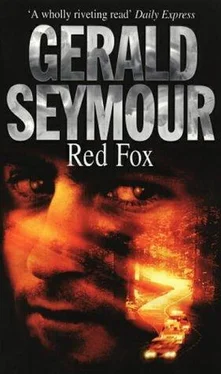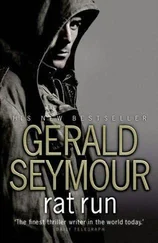Gerald Seymour - Red Fox
Здесь есть возможность читать онлайн «Gerald Seymour - Red Fox» весь текст электронной книги совершенно бесплатно (целиком полную версию без сокращений). В некоторых случаях можно слушать аудио, скачать через торрент в формате fb2 и присутствует краткое содержание. Жанр: Триллер, на английском языке. Описание произведения, (предисловие) а так же отзывы посетителей доступны на портале библиотеки ЛибКат.
- Название:Red Fox
- Автор:
- Жанр:
- Год:неизвестен
- ISBN:нет данных
- Рейтинг книги:5 / 5. Голосов: 1
-
Избранное:Добавить в избранное
- Отзывы:
-
Ваша оценка:
- 100
- 1
- 2
- 3
- 4
- 5
Red Fox: краткое содержание, описание и аннотация
Предлагаем к чтению аннотацию, описание, краткое содержание или предисловие (зависит от того, что написал сам автор книги «Red Fox»). Если вы не нашли необходимую информацию о книге — напишите в комментариях, мы постараемся отыскать её.
Red Fox — читать онлайн бесплатно полную книгу (весь текст) целиком
Ниже представлен текст книги, разбитый по страницам. Система сохранения места последней прочитанной страницы, позволяет с удобством читать онлайн бесплатно книгу «Red Fox», без необходимости каждый раз заново искать на чём Вы остановились. Поставьте закладку, и сможете в любой момент перейти на страницу, на которой закончили чтение.
Интервал:
Закладка:
The ideas of Giancarlo convoluted and hesitant when conceived in the rocking pace of the rapido were now near to fulfilment.
Wild and ill-thought at their birth, they now seemed to him to own a pattern and a value. Worth a smile, little fox, worth a grin.
Unchallenged, he had walked out of the small station with its wide platforms on the Reggio esplanade, gulped at a waft of sea-blown air, and mingled with the stream of descending passengers.
If there were watching polizia at the barrier, Giancarlo had not seen them, and there had been no shouted command to halt. He had walked from the station, among the people laden with suitcases and string bags. The snakes of humanity had slithered in their differing directions, splintering again and again till he was alone. In a tabacchi he purchased a map of Calabria. The names were clear and well remembered. Sinopli… Delianuova…
Acquaro… Cosoleto. He found them where the red ribbons of the roads began to twist into the uplands of the Aspromonte, beyond the green-shaded coastal strip, far into the deeper sand and brown of the rising ground.
In early afternoon with the time of siesta weighty on the empty streets, Giancarlo found his car. Among the white-washed houses, with the light battering back at his unprotected eyes, parked haphazardly as if the owner were late for an important meeting, not just restless for his lunch. The life of the Mezzo Giorno ruled, the land of the half day. Washing hung down, bleached and stiffened, from the balcony of a house under which was abandoned a red Fiat 127. Right outside the front door, keys in the ignition. Shutters fastened to protect the cool in the interior, not a child crying, not a grandmother complaining, not a radio tuned to music. He slipped into the driving seat, eased off the handbrake and coasted slowly down the incline, waiting till he was clear of the corner before firing the engine.
He headed north for the long viaduct, where the Mafiosi had made their fortunes in extortion from those who needed to move in materials and equipment and found it cheaper to concede the dues than to fight. He drove slowly because that was the style of the Calabrian after lunch and his need to avoid drawing attention was as acute as ever. His face was sufficient of a problem, white with the pallor of prison and confinement in the covo; not the complexion of the south, not the burned and dark wood tan of those who owned this country. He drifted past the turn-off signs to Gallico and Carnitello, and climbed high with the road above the sea channel that separated the Sicilian island from the mainland. For a moment he slowed and stared hard away to his left, his gaze held on the sprawl of Messina away across the azure of the water.
Messina, blurred and indistinct, lay white in the sun among the spreading green and rust of parks and waste ground. Messina, where they had built the gaol for the girls. This was where they had taken La Vianale, where Curcio's Nadia had waited for her trial, where if he did not succeed his Franca would decay and crumble. He could not see the prison, not across eight kilometres of reflecting sea, but it was there, a spur and a goad.
The car increased speed. Past the road on the left to Scilla, and on the right to Gambarie. Through the booming length of rock cut tunnels, and on into the interior. Sinopli and Delianuova were signed to the right and he pulled the little Fiat off the dual carriageway and started the winding negotiation of the hill road.
Through Santa Eufemia d'Aspromonte, a barren and meagre community where his coming scattered only the chickens feeding in the road gravel, and his going raised barely an eyebrow of attention from the elderly who sat in black skirts and suits in front of their homes. Through Sinopli where he hooted for the right to pass a bus that struggled in an exhaust cloud on the main street, and where the shops were still padlocked, and it was too hot, too sickly clammy for the ragazzi to have brought out their plastic footballs.
Bitter country now. Laden with rock and precipice, covered with the toughened scrub and trees that grew from little earth. In low gear, rising and descending, Giancarlo drove on, till he was over the old and narrow stone bridge across the Vasi, and into Acquaro. Perhaps some saw him go through the village but he was unaware of them, studying by turns the map laid out on the front passenger seat, and the perils of the curving route. A half-kilometre further, he stopped. There was a lay-by, and a heap of gravel where the workmen would come in the winter when there was ice to make the road safe for motorists. Further back was a turn-in among the trees where perhaps the hunting parties parked their cars on Sundays or the young men took the virgins when they could no longer suffer the claustrophobia of the family in the front room and the watch of the Madonna above the fireplace. Giancarlo grinned to himself. Wrong day for hunters, too early in the evening for virgins. This was a place for him to park hidden from the road. He drove as far between the trees as the track permitted.
From habit, in the quiet of his seat, Giancarlo checked over the P38, stroked its silk barrel length, and wiped on his shirt waist the faint stains on the handle. Eight bullets only, eight to do so much with. He climbed lightly from the car, eased the pistol back into his belt and was lost in the close foliage.
He skirted the road, leaving it what he judged to be a hundred metres on his left, seeking the thickness of the wood, easing on to the toes of his canvas shoes, thankful for the cover. It took him only a few minutes before he found the vantage point for the once-white house from which paint and plaster alike peeled, served by a rutted track. A hovel to Giancarlo, a place for sheep and cows. Medieval, had it not been for the car parked outside the only door. This was the home of a contadino, a peasant; and his wife moved beside the building with a bucket, and his half-clothed children played with a spar of wood. The boy settled himself comfortably on the mould of generations of fallen leaves and watched and waited for the brother of the wife of Claudio.
Not long. Not long enough to try him.
A big man, balding above a flat weatherbeaten forehead.
Cheeks that were not shaved, trousers that were held at the waist with string, a shirt that was torn at the armpit. Contadino, Giancarlo spat the word. But of the proletariat, surely? He smiled mirthlessly. A servant of the bosses…? The boy agreed, satisfied in the ideology equation. The man carried a plastic bag and walked down the track from his house to the road, paused there and his eyes traversed a sweep that covered the boy's hide. The man had passed close to where Giancarlo lay before his sounds subsided. Like a stoat, Giancarlo was after him, ears cocked and attuned to the distant noises in front, eyes fastened on the dried twigs and oak leaves that he must not break nor displace.
The tree line covered the rim of a slight hill, beyond it was a roughened field indented from the cattle's wet spring grazing. On the far side of the open ground Giancarlo saw the stone-built barn with its rain-reddened tin roof and two doors facing him.
The man he had followed was met by one who had come from the right-hand door and who carried a single-barrelled shotgun, the weapon of the country people. They talked a brief discourse, before the bag was handed over and a gust of laughter carried to the boy. As the man retraced his steps, Giancarlo melted among the trees and undergrowth, unseen, unheard.
When it was safe he came slowly forward to the dry stone wall that skirted the field, and picked his watching place. A boundless pride swept through him. He wanted to stand up and shout defiance and exultation. Giancarlo Battestini, remember the name, because he had found the Englishman of the multinationals, and would exploit him, as the foreign companies exploited the proletariat.
Читать дальшеИнтервал:
Закладка:
Похожие книги на «Red Fox»
Представляем Вашему вниманию похожие книги на «Red Fox» списком для выбора. Мы отобрали схожую по названию и смыслу литературу в надежде предоставить читателям больше вариантов отыскать новые, интересные, ещё непрочитанные произведения.
Обсуждение, отзывы о книге «Red Fox» и просто собственные мнения читателей. Оставьте ваши комментарии, напишите, что Вы думаете о произведении, его смысле или главных героях. Укажите что конкретно понравилось, а что нет, и почему Вы так считаете.












